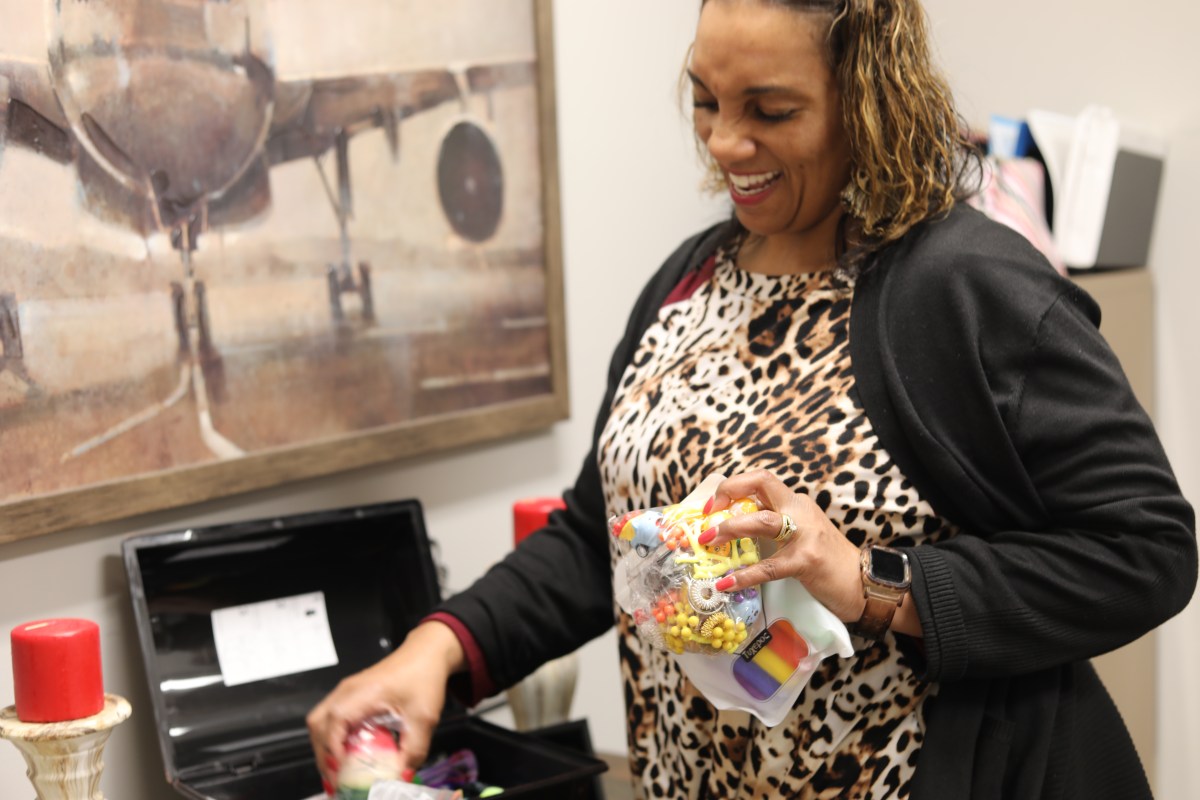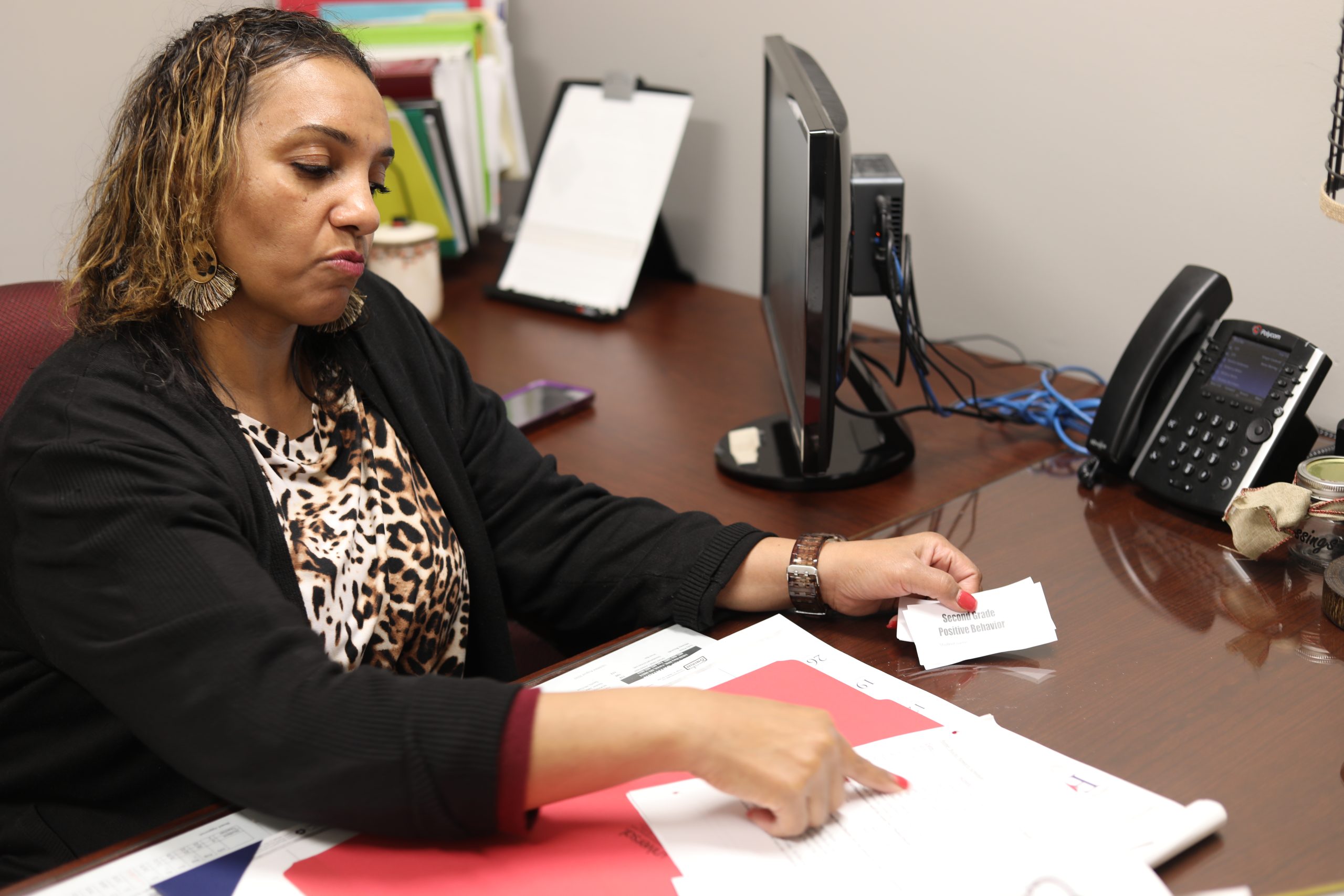Mississippi Today
Corporal punishment was used in schools 4,300 times last year. Here’s what districts are doing to change that.
Corporal punishment was used in schools 4,300 times last year. Here’s what districts are doing to change that.
Shortly after moving to Madison, Jamie Bardwell learned that the Madison County School District requires parents to opt out in writing from corporal punishment being used on their children, a fact she discovered from other students talking about it in her son’s class.
“A kid got paddled, came back and told my son, and my son was terrified,” she said. “I explained to him that that would never happen to him, we’ve written this letter, but it’s really scary for kids to have people in their classroom come back with these stories. Even if your kid isn’t the one who is subjected to corporal punishment, they’re still being impacted by it.”
The Madison County School District told Mississippi Today that corporal punishment is an option in the district, and that parents are always consulted before it is administered.
The U.S. Department of Education Office of Civil Rights tracks corporal punishment data in public schools nationally, which is generally defined as the use of physical force to discipline students. Often called paddling, the term stems from using a wooden paddle to hit a student on the butt.
Federal data shows that over the last decade, Mississippi had more corporal punishment incidents than any other state for every year data was collected. In the 2017-18 school year, the most recent year for which there is federal data, nearly 30% of all incidents occurred in Mississippi. In the same year, 22 states reported at least one incident of corporal punishment and 10 reported over 1,000 instances.
The Mississippi Department of Education has more recent data, also for public schools. Instances of corporal punishment fell by over 23,000 from the 2016-17 school year to the 2021-22 school year. School leaders attributed this to a combined influence of the pandemic and a 2019 state law which banned the use of corporal punishment on a student with a special education classification.
Some districts began the work of rethinking discipline models before the 2019 law passed.
William Murphy, director of student affairs for the Sunflower County Consolidated School District, said the district’s process of veering away from corporal punishment started in 2016 with restorative justice trainings, a practice that seeks to repair harm caused rather than focus on punishment. When the 2019 law passed, Murphy said multiple administrators told him they rarely utilized it anyway “just because of the lack of effect that it was having.”
He acknowledged that the decline, from 400 incidents in 2016 to 22 in 2022, was impacted by the pandemic and students not being physically in school. However, he said he doesn’t expect to see a return because of the emphasis the pandemic put on social-emotional learning.
“The pandemic allowed us to see into some children’s homes, to see some things that we might have not been privy to before,” Murphy said.
“When you’re having to do more home visits or get closer acclimated to students at home, you learn some things that I think will make you less likely to use corporal punishment,” he continued. “When you learn that a child might have been abused or that a home situation is particularly traumatic, I just think there’s a push to do more counseling, more talking.”
In the Scott County School District, Assistant Superintendent Chad Harrison said the district’s decline in corporal punishment was strongly linked to the 2019 law going into effect. Concerned that a teacher would mistakenly administer corporal punishment to a special education student, the district changed its policy so that it can only be used by administrators or administrative assistants. The district went from nearly 1,800 incidents in 2016 to 532 in 2022.
Harrison also said that the district has focused more energy on Positive Behavioral Interventions and Supports, a framework which seeks to reward students for positive behavior rather than penalize them for negative.

Valeria Wilson, the behavior specialist for the district, explained the shift includes both creating a culture of rewards for all students and developing individualized plans for students who are struggling with behavior problems.
At every school, teachers, cafeteria workers, janitors, and front desk employees all have “bucks” that they can give students to reward behaviors like being respectful or paying attention. Students use the bucks to buy snacks or gain entry to celebrations throughout the year.

When students are put on a behavior plan, Wilson works with the student and a committee to develop daily goals and rewards if the student meets them. As a part of the plan, an adult checks in with the student daily to discuss their behavior and provide instant feedback.
“It’s just simply making them aware of their actions,” Wilson said.
Wilson also said that students are involved in the process of selecting their rewards in order to better motivate them.
“You have to find out what the interests of that kid are, and you can only do that by building relationships with them, and then you build your plan around that student,” she said.
Despite the shifts toward other discipline models that some districts are making, advocates are concerned that corporal punishment numbers will tick back up.
Ellen Reddy, executive director of the Nollie Jenkins Family Center in Holmes County, said she believes the pandemic accounts for some of the decline, but is also concerned districts are not being monitored properly.
The Nollie Jenkins Family Center released a report in 2021 highlighting significant disparities in corporal punishment reporting data between the Mississippi Department of Education and the federal government. Jean Cook, communications director for the Mississippi Department of Education, said MDE could not explain these differences, but that districts are not required to respond to any data quality questions from the federal government. A spokesperson for the U.S. Department of Education did not respond to questions regarding their validation process.
When asked how MDE verifies its own data, Cook said districts are required by state law to report accurate information to the state’s data management system and, in doing so, verify their monthly data reports before submitting them to the department. The department does not independently verify this data after it is received unless a complaint is filed.
When talking about the decline of this practice in Mississippi, Reddy and her associates expressed concern about the demographic profile of the students who are still receiving corporal punishment, as national research has shown corporal punishment is disproportionately used on Black students.
“Any student that experiences it is one student too many, so who’s still left in that category, what do they look like, and why are they still experiencing it?” asked Chanya Anderson, a data analysis consultant working with the Nollie Jenkins Family Center. “Because if you’re talking about such a drastic decline, what is it about those students that you still feel the need to use corporal punishment if your model has now shifted to something else?”
MDE data shows that for the 2021-22 school year, nearly 60% of corporal punishment instances were administered to Black students, while 35% happened to white students. For the same school year, 47% of K-12 students were Black and 43% were white.
Anderson also said that laws temporarily put a damper on certain practices, which could explain the decline in corporal punishment incidents.
“When you enact any law, even if laws don’t affect all populations … that’s still going to bring attention to the plight of corporal punishment generally,” Anderson said. “In light of laws, you will often see institutions pull back momentarily, and then as people forget about it and move on, they’ll start to increase their usage of it again once the spotlight has moved off the topic.”
This legislative session, Rep. Carl Mickens, D-Brooksville, introduced a bill to ban corporal punishment but it died, as have his previous efforts for the last five years. Mickens said he doesn’t think the practice “will cause a child to learn, I think it might cause them not to want to learn.” Though he disagrees with the practice, he said ultimately only legislative leadership has the power to decide if a bill progresses.
Rep. Richard Bennett, R-Long Beach, chair of the House Education Committee, said he has not taken up the bills to ban it because he believes corporal punishment is a local issue. He said he has not looked at research on how it impacts children.
Studies have shown that corporal punishment can lead students to be more aggressive, have higher rates of depression, and perform worse in school. Morgan Craven, federal policy director for the Intercultural Development Research Association, said it’s telling that so many groups have lined up in opposition, including psychiatrists, pediatricians, lawyers, public health officials, school counselors and educators.
“Not only is it ineffective, but it can actually make issues worse,” Craven said. “Whatever it is that is leading to a particular behavior, it is not solved by hitting a kid.”
Francine Jefferson, who was a board member of the former Holmes County School District, advocated to end corporal punishment when she was on the board from 2010-2018. While she did not achieve a complete ban, the board did change policies to restrict the practice, including allowing parents to opt out.
“I grew up in that environment where teachers are allowed to paddle the kids. I mean, hell, the bus drivers could paddle you, everybody could paddle you,” Jefferson, who also grew up in the district, said. “I grew up with that experience, and it wasn’t a pleasant one … That’s why I pushed so much for it because I never forgot that experience.”
The district later banned the practice entirely in 2018 after consolidation, but Jefferson said she is still concerned about it happening in Holmes County and other parts of the state.
“How many pounds of pressure do you put on a child’s bottom?” she said. “What’s the right amount? Nobody knows. If you can’t tell me that, then I don’t think you need to do it because you can’t take it back.”
This article first appeared on Mississippi Today and is republished here under a Creative Commons license.
Mississippi Today
Brain drain: Mother understands her daughters’ decisions to leave Mississippi
Editor’s note: This Mississippi Today Ideas essay is published as part of our Brain Drain project, which seeks answers to Mississippi’s brain drain problem. To read more about the project, click here.
Back when I was a kid in 1988, my mama and I had an argument about what I wanted to major in at college.
I had dreamed of being a journalist since the age of 8. To me, that meant that I was going to Ole Miss, which had the journalism department.
My mama said I could only go away from home to Ole Miss if I was going to major in law.
So I settled on going to Mississippi State University just down the road and majoring in communication. She told me I should major in engineering since that’s what State was known for.
I said, “That’s even dumber than me going to law school. I hate math.”
“Well, you could at least try,” she said.
I said no. Then she told me I was wasting my education and turned her back on me.
I get it. She knew and I knew that I couldn’t stay in Choctaw County where I was raised and earn a living with that degree. I would have to go somewhere else — probably to the Jackson metro area and work for Gannett or the Associated Press. Or to Memphis. Or Biloxi. Or even New Orleans. She never really forgave me for moving to the Jackson metro, working in my field and raising her grandchildren so far from her.
After a while, I got used to the pace of life around here. I knew I probably wouldn’t ever move anywhere else because I noticed that people who left Mississippi often came back, whether due to family obligations or a realization that “somewhere else” wasn’t quite all it was cracked up to be.
I also noticed that a lot of people played up how they were from Mississippi while making a very good living being someplace else. I decided I wanted to prove you could be from Mississippi, live in Mississippi, work in Mississippi and make something of yourself without leaving Mississippi.
But I noticed something else over the years, too. Most of the kids in Brandon dreamed of going off from home to cities like Atlanta, Nashville, Dallas, DC, New York or Orlando. They didn’t seem to have reasons — just a desire to get away from the state as fast as they could.
Then my three daughters and I started having conversations about what they wanted to major in when they went to college. My oldest wanted to be a chef. My middle one was undecided between chemical engineering and landscape architecture. And my youngest was fascinated with roads and bridges.
I was all too aware of what had happened in the job markets in Mississippi since I had come up. Companies closed operations in a globalized economy and fled to cheaper labor markets. The advent of the internet meant employers could hire from all over the world. Longtime business leaders retired and sold out to big corporations that reduced investments in local communities that had supported those businesses for decades and then complained that those towns didn’t offer enough amenities for their employees to want to relocate there.
But the reality really set in when my chef daughter chose her first internship — in historic Williamsburg, Virginia.
I would never have dreamed of driving that far from home to try out a place to work when I was her age. Then after her senior year, she interned at Walt Disney World and got hired full-time before the internship was over. She was off to live in Orlando where now with her husband and young son she’s creating community and loves going to work every day with a pretty enviable benefits package, too, a thing unheard of in the culinary world in Mississippi.
My middle one finally settled on chemical engineering and was picked for a co-op job in her first semester at age 18 at a company in Georgia. When she graduated four years later, we packed her off to Indiana for a research and development job, and she now lives in New Hampshire with her husband, making six figures a year at 26 years old and looking forward to partaking in the cultural offerings in New York City when she can.
The youngest is currently in college for civil engineering, and I’m bracing myself for the inevitable. She doesn’t want to work for state government, so she’s likely going out of state as well. Her comment about coming back to Jackson metro was the most damning of all. “There’s nothing to do here,” she says.
A lot of people ask me questions: How often do you see your daughters? How can you stand being so far from your grandson? Don’t they at least come home for Christmas?
The answer to all of those questions is that we do the best we can. We text, we message on Facebook, we talk on the phone at least once a week, every Sunday. We arrange visits; sometimes it’s us driving to them while other times they drive to us.
I can’t imagine making my children as miserable as my mom made me over my life choices. We are flexible, understanding, and very, very proud of our daughters, who are grappling with enough in their lives without us loading them down with guilt over when they are coming home.
The calculus may change in the future. We may have declines in health and need to move closer to one of our children if we need assistance. Or we may need to be in assisted living care here in Mississippi where such care may be marginally cheaper than wherever our girls land.
But I don’t wish our girls had settled for life in Mississippi.
What I wish is that Mississippi could find a way to live up to its potential — to be a place more worthy of my daughters’ loyalty, affections and investment in themselves.
Maybe it will be someday. I hope so, for all of our sakes.
Julie Liddell Whitehead lives and writes from Mississippi. An award-winning freelance writer, Julie covered disasters from 9/11 to Hurricane Katrina throughout her career. Her first book is “Hurricane Baby: Stories,” published by Madville Publishing. She writes on mental health, mental health education and mental health advocacy. She has a bachelor’s degree in communication, with a journalism emphasis, and a master’s degree in English, both from Mississippi State University. In 2021, she completed her MFA from Mississippi University for Women.
This article first appeared on Mississippi Today and is republished here under a Creative Commons Attribution-NoDerivatives 4.0 International License.
The post Brain drain: Mother understands her daughters' decisions to leave Mississippi appeared first on mississippitoday.org
Note: The following A.I. based commentary is not part of the original article, reproduced above, but is offered in the hopes that it will promote greater media literacy and critical thinking, by making any potential bias more visible to the reader –Staff Editor.
Political Bias Rating: Center-Left
This essay reflects a Center-Left perspective by focusing on social and economic challenges faced by Mississippi, such as brain drain, job market changes, and community decline. The tone is empathetic and advocates for investment in local opportunities and amenities to retain talent, aligning with progressive concerns about economic inequality and regional development. However, it remains largely personal and reflective rather than explicitly ideological or partisan. The article critiques systemic economic shifts without advancing a polarized political agenda, emphasizing hope for future improvement and a more supportive environment for young professionals.
Mississippi Today
After 30 years in prison, Mississippi woman dies from cancer she says was preventable
Behind Bars, Beyond Care:
A Mississippi Today investigation into suffering, secrecy and the business of prison health care
Susie Balfour, diagnosed with terminal breast cancer two weeks before her release from prison, has died from the disease she alleged past and present prison health care providers failed to catch until it was too late.
The 64-year-old left the Central Mississippi Correctional Facility in December 2021 after more than 30 years of incarceration. She died on Friday, a representative for her family confirmed.
Balfour is survived by family members and friends. News of her passing has led to an outpouring of condolences of support shared online from community members, including some she met in prison.
Instead of getting the chance to rebuild her life, Balfour was released with a death sentence, said Pauline Rogers, executive director of the RECH Foundation.
“Susie didn’t just survive prison, she came out fighting,” Rogers said in a statement. “She spent her final years demanding justice, not just for herself, but for the women still inside. She knew her time was limited, but her courage was limitless.”
Last year, Balfour filed a federal lawsuit against three private medical contractors for the prison system, alleging medical neglect. The lawsuit highlighted how she and other incarcerated women came into contact with raw industrial chemicals during cleaning duty. Some of the chemicals have been linked to an increased risk of cancer in some studies.
The companies contracted to provide health care to prisoners at the facility over the course of Balfour’s sentence — Wexford Health Sources, Centurion Health and VitalCore, the current medical provider — delayed or failed to schedule follow-up cancer screenings for Balfour even though they had been recommended by prison physicians, the lawsuit says.
“I just want everybody to be held accountable,” Balfour said of her lawsuit. “ … and I just want justice for myself and other ladies and men in there who are dealing with the same situation I am dealing with.”
Rep. Becky Currie, who chairs the House Corrections Committee, spoke to Balfour last week, just days before her death. Until the very end, Balfour was focused on ensuring her story would outlive her, that it would drive reforms protecting others from suffering the same fate, Currie said.
“She wanted to talk to me on her deathbed. She could hardly speak, but she wanted to make sure nobody goes through what she went through,” Currie said. “I told her she would be in a better place soon, and I told her I would do my best to make sure nobody else goes through this.”
During Mississippi’s 2025 legislative session, Balfour’s story inspired Rep. Justis Gibbs, a Democrat from Jackson, to introduce legislation requiring state prisons to provide inmates on work assignments with protective gear.
Gibbs said over 10 other Mississippi inmates have come down with cancer or become seriously ill after they were exposed to chemicals while on work assignments. In a statement on Monday, Gibbs said the bill was a critical step toward showing that Mississippi does not tolerate human rights abuses.
“It is sad to hear of multiple incarcerated individuals passing away this summer due to continued exposure of harsh chemicals,” Gibbs said. “We worked very hard last session to get this bill past the finish line. I am appreciative of Speaker Jason White and the House Corrections Committee for understanding how vital this bill is and passing it out of committee. Every one of my house colleagues voted yes. We cannot allow politics between chambers on unrelated matters to stop the passage of good common-sense legislation.”
The bill passed the House in a bipartisan vote before dying in the Senate. Currie told Mississippi Today on Monday that she plans on marshalling the bill through the House again next session.
Currie, a Republican from Brookhaven, said Balfour’s case shows that prison medical contractors don’t have strong enough incentives to offer preventive care or treat illnesses like cancer.
In response to an ongoing Mississippi Today investigation into prison health care and in comments on the House floor, Currie has said prisoners are sometimes denied life saving treatments. A high-ranking former corrections official also came forward and told the news outlet that Mississippi’s prison system is rife with medical neglect and mismanagement.
Mississippi Today also obtained text messages between current and former corrections department officials showing that the same year the state agreed to pay VitalCore $100 million in taxpayer funds to provide healthcare to people incarcerated in Mississippi prisons, a top official at the Department remarked that the company “sucks.”
Balfour was first convicted of murdering a police officer during a robbery in north Mississippi, and she was sentenced to death. The Mississippi Supreme Court reversed the conviction in 1992, finding that her constitutional rights were violated in trial. She reached a plea agreement for a lesser charge, her attorney said.
As of Monday, the lawsuit remains active, according to court records. Late last year Balfour’s attorneys asked for her to be able to give a deposition with the intent of preserving her testimony. She was scheduled to give one in Southaven in March.
Rogers said Balfour’s death is a tragic reminder of systemic failures in the prison system where routine medical care is denied, their labor is exploited and too many who are released die from conditions that went untreated while they were in state custody.
Her legacy is one RECH Foundation will honor by continuing to fight for justice, dignity and systemic reform, said Rogers, who was formerly incarcerated herself.
This article first appeared on Mississippi Today and is republished here under a Creative Commons Attribution-NoDerivatives 4.0 International License.
The post After 30 years in prison, Mississippi woman dies from cancer she says was preventable appeared first on mississippitoday.org
Note: The following A.I. based commentary is not part of the original article, reproduced above, but is offered in the hopes that it will promote greater media literacy and critical thinking, by making any potential bias more visible to the reader –Staff Editor.
Political Bias Rating: Center-Left
This article presents a critical view of the Mississippi prison health care system, highlighting systemic failures and medical neglect that led to the death of a formerly incarcerated woman. The tone and framing focus on social justice issues, prisoner rights, and the need for government accountability and reform, which align with Center-Left values emphasizing government responsibility for vulnerable populations. While the article is largely investigative and fact-based, its emphasis on advocacy for reform, criticism of privatized prison health contractors, and highlighting bipartisan legislative efforts suggest a Center-Left leaning perspective rather than neutral reporting.
Mississippi Today
FBI concocted a bribery scheme that wasn’t, ex-interim Hinds sheriff says in appeal
Former interim Hinds County sheriff Marshand Crisler is appealing bribery and ammunition charges stemming from his 2021 campaign, arguing that the federal government played on his relationship with a former supporter to entrap him.
Crisler had asked Tonarri Moore, who donated to past campaigns, for a financial contribution for the sheriff’s race. Moore said he would donate if Crisler helped with several requests. Without the previous relationship, Crisler would not have acted, his attorney argues, and Crisler had no reason to believe he was being bribed.
“The government, having concocted a bribery scheme to entrap Crisler, then had to contrive a corresponding quid pro quo to support the scenario with which to entrap him,” attorney John Holliman wrote in a Saturday appellant brief.
Crisler is asking the U.S. 5th Circuit Court of Appeals to reverse his conviction and render its own rulings on both counts.
He was convicted in federal court in November after a three-day trial and sentenced earlier this year to 2 ½ years in prison. Crisler is serving time in FCI Beckley in West Virginia.
The day before Crisler reached out to Moore to ask for support for his campaign for sheriff, Drug and Enforcement Administration agents raided Moore’s home and found guns and drugs. An FBI agent called to the scene looked through Moore’s phone and saw Crisler had called.
According to the appellant brief, the agent asked Moore what Crisler would do if offered money, and if Moore was bribing him. Moore said he wasn’t bribing Crisler, and the agent asked if Moore would do it.
At that time, there weren’t reasonable grounds to start a bribery investigation into Crisler, his attorney argues, nor was there reason to believe he was seeking a bribe.
Moore agreed to become an informant for the FBI, in exchange for the government not prosecuting him for the guns and drugs.
The FBI fitted him with a wire to record Crisler during meetings, which began that day. The meetings included one inside Moore’s night club and a cigarette lounge in Jackson. Agents provided Moore with the $9,500 he gave to Crisler between September and November 2021.
Crisler’s 2023 indictment came as he campaigned again for sheriff and months before the primary election. He remained in the race and lost to the incumbent who he faced in 2021.
At trial, the government argued the exchange of money were attempts to bribe because Moore made several requests of Crisler: to move his cousin to a different part of the Hinds County Detention Center, to get him a job in the sheriff’s office and for Crisler to let Moore know if law enforcement was looking into his activities.
In closing arguments, Assistant U.S. Attorney Charles Kirkham pointed to examples of quid pro quo in recordings, including one where Moore said to Crisler, “You scratch my back, I scratch yours” and Crisler replied “Hello!” in a tone that the government saw as agreement.
The appellant’s brief argues that without Moore’s requests, the government lacked a way to show quid pro quo, a requirement of bribery charge: that Crisler committed or agreed to commit an official act in exchange for funds.
Moore also asked Crisler to give him bullets despite being a convicted felon, which is prohibited under federal law. The brief notes how the government directed Moore to come up with a story for needing the bullets and to ask Crisler to give them to him.
In response, Crisler told Moore he could buy bullets at several sporting goods stores. Moore said they ran out, and eventually Crisler gave him bullets.
Crisler also argues that the government prosecuted routine political behavior. Specifically, accepting campaign donations is not illegal, and can not constitute bribery unless there is an explicit promise to perform or not perform an official act in exchange for money.
“Our political system relies on interactions between citizens and politicians with requests being made for this or that which is within the power of the elected official to do,” the brief states. “This does not constitute a bribery scheme. It is the normal working of our political system.”
This article first appeared on Mississippi Today and is republished here under a Creative Commons Attribution-NoDerivatives 4.0 International License.
The post FBI concocted a bribery scheme that wasn’t, ex-interim Hinds sheriff says in appeal appeared first on mississippitoday.org
Note: The following A.I. based commentary is not part of the original article, reproduced above, but is offered in the hopes that it will promote greater media literacy and critical thinking, by making any potential bias more visible to the reader –Staff Editor.
Political Bias Rating: Center-Right
The article presents the legal appeal of former interim Hinds County sheriff Marshand Crisler with a focus on his argument that the FBI orchestrated an entrapment scheme. The language is largely factual and centers on the defense’s claims and legal standards for bribery, emphasizing normal political behavior versus illegal conduct. While the article reports on the government’s position, it gives significant space to Crisler’s defense and critiques of federal prosecution tactics. This framing, highlighting skepticism toward federal law enforcement and emphasizing the defense perspective, suggests a slight center-right leaning, reflecting a cautious stance on government overreach without overt ideological language.
-
News from the South - Texas News Feed5 days ago
Rural Texas uses THC for health and economy
-
News from the South - Texas News Feed7 days ago
Yelp names ‘Top 100 Sandwich Shops’ in the US, several Texas locations make the cut
-
Mississippi Today2 days ago
After 30 years in prison, Mississippi woman dies from cancer she says was preventable
-
News from the South - Kentucky News Feed6 days ago
Harrison County Doctor Sentenced for Unlawful Distribution of Controlled Substances
-
News from the South - Texas News Feed7 days ago
Released messages show Kerrville officials’ flood response
-
News from the South - Louisiana News Feed7 days ago
Residents along Vermilion River want cops to help prevent land loss
-
News from the South - West Virginia News Feed7 days ago
‘Good government’ group urges blue states to back away from a redistricting arms race
-
News from the South - Florida News Feed7 days ago
Officer shot, hospitalized after shooting near Busch Gardens













































